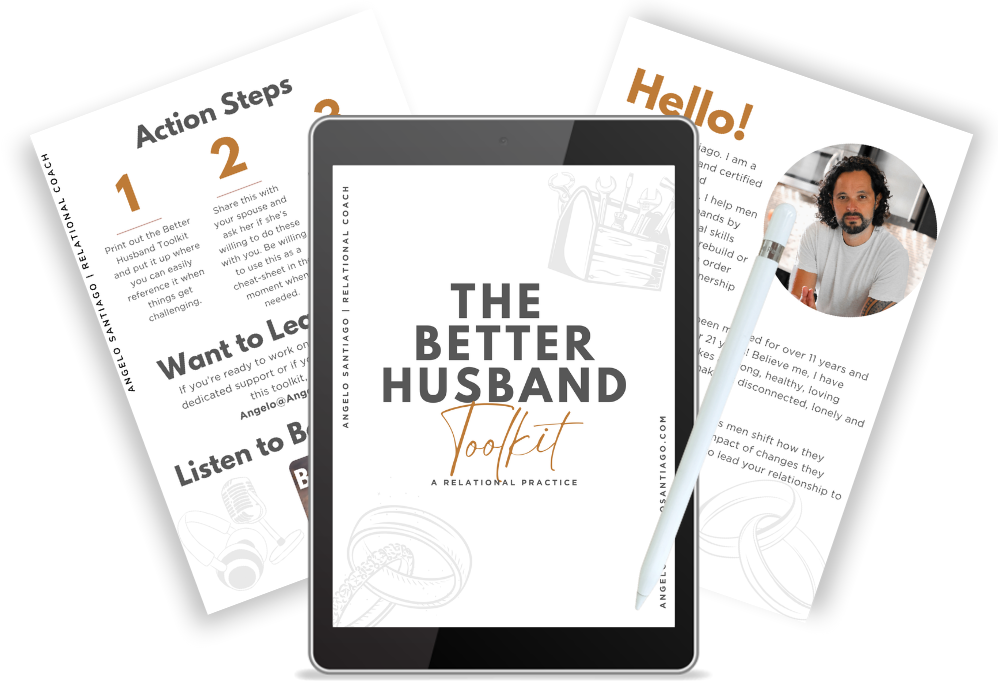The Top 2 Secrets You NEED to Stay Calm in Marriage Conflict
Nov 17, 2025
When your wife is upset, emotional, or confrontational, it’s easy to get reactive. There are a myriad of possibilities for how you could react, but some of the most common ones for men are: shutting down, getting defensive, or pushing back. Whatever your pattern looks like, it usually ends the same way: things get worse, not better.
And it happens fast, too. So fast, that sometimes you don’t even realize it’s happened until it’s too late. One small comment, one moment of tension, and suddenly you feel it: your chest tightens, your gut twists, your jaw clenches. Before you know it, you’ve reacted. And now you’re both distant, frustrated, and wondering how you got here again.
If you’ve ever walked away from an argument thinking, “I should’ve handled that better,” you’re going to want to keep reading. This article will cover what’s really happening in those moments, as well as how to change it.
The Reasons Behind Reacting Before You Think
As a man, you’ve been trained to react fast throughout your life. When something needs to happen, you make it happen. You take control, solve the problem and, above all, you get moving.
That instinct serves you well at work, in emergencies, or when life throws something unpredictable your way. But, as is so often the case, this approach is not a one-size-fits-all. In your marriage, that same instinct can backfire instead.
When emotions are high, reacting fast can mean you speak before you think, raise your voice without realizing it, or shut down completely. You try to fix things instead of actually being present with what your wife needs.
It’s not that you want to be disconnected. It’s that your reaction moves faster than your mind.
So, how do you change that? By learning one of the most powerful tools you can use in your marriage—the pause.
Pausing Is More Powerful Than You Think

For most men, the hardest work isn’t about doing more. Quite the opposite, actually. It’s about slowing down.
When something feels uncomfortable your instinct is to get out of that discomfort as fast as possible. An example of this is when your wife is sad, hurt, or upset. Maybe you try to fix it, or maybe you shut down and wait for it to pass.
What if, instead of reacting, you learned to pause?
The pause is simple: when you feel the urge to react, stop. Don’t say anything. Don’t move to fix. Just pause. Stay in the discomfort a little longer than feels comfortable.
Then, breathe.
In through the nose, out through the mouth.
It sounds almost too simple, but that pause is everything. And simple doesn’t mean easy. This is a habit you will need to practice, especially noticing when you’re about to react.
But it’s so important you master this technique, because it’s the bridge between reactivity and connection (or your automatic response and a conscious choice).
A Simple Way to Stay Grounded
Here’s what’s happening under the surface: when you’re triggered, your body floods with stress. Your nervous system goes into fight, flight, or fix mode.
In that state, you don’t have access to your best self. In other words, the one who can listen, empathize, or connect. You’re not in relationship mode; you’re in protection mode.
But don’t worry: your body has a built-in reset button.
It’s your breath.
One deep breath can activate your parasympathetic nervous system, which is the part of you that calms down and helps you think clearly again.
So when you feel that surge of emotion, here’s what to do:
- Stop.
- Breathe in slowly through your nose.
- Exhale even slower through your mouth.
- Feel your feet on the ground.
- Remind yourself: “I’m not in danger. I don’t need to fix this. I just need to stay present.”
That’s the work. Stay present and available, don’t run, don’t push, don’t disappear. Even if you don’t know what to say yet, remember that your presence is enough.
Once you’ve found your footing again, you can start to shift from reaction to reconnection.
From Reaction to Connection: What to Do Instead
After the pause comes the choice. Once you’ve calmed your body and mind, it’s time to practice two powerful relational skills:
- Listen to Understand
- Speak to Make Things Better
These are two of the five “winning strategies” necessary to transform the way you handle conflict. Without them, you’ve started the journey to healthier interactions in your marriage, but you’ve still got a long way to go.
Strategy #1: Listen to Understand
When emotions run high, most men want to fix the problem, and fix it fast. But your wife doesn’t always need a solution. She often just needs to feel heard and understood.
Listening to understand means slowing down and getting curious. What happened to make her feel this way? Instead of planning your defense or your next line, you focus entirely on what she’s saying and how she feels. It’s a thought process that involves selflessness, generosity, and empathy, so you’re going to want to dig deep for this.
You can ask:
- “Can you tell me more?”
- “What do you need right now?”
- “I want to understand what this is like for you.”
You’re not interrupting or correcting. You’re simply being there.
And—equally as important as curiosity—you don’t move on until she feels seen and heard. That’s your only job in that moment.
When she feels understood, that’s when she’ll open back up and you both can start the process of rebuilding your connection.
Strategy #2: Speak to Make Things Better

Once your partner feels heard, your words begin to matter again. This is where you can speak in a way that helps instead of hurts.
Most men either say nothing and disappear emotionally, or they talk fast trying to fix the issue or win the argument. And (spoiler alert) neither helps.
So before you speak, check your intention.
Ask yourself:
- “What would help her right now?”
- “How can I use my words to serve the relationship?”
You can even ask her directly:
- “What can I do right now to help?”
- “Is there anything you need to hear from me?”
Sometimes she just needs reassurance. Sometimes a plan. Sometimes she just needs to know you’re still there.
Rather than trying to fix her, your job is simply to be with her.
When you speak to make things better, you create safety and connection instead of distance and defense.
What Changes When You Pause
Here’s what all of this adds up to:
When you pause instead of snap…
When you listen instead of defend…
When you ask instead of assume…
You build safety, clarity, and connection.
Conflict doesn’t disappear, but you stay grounded through it. You stay in relationship instead of reaction. And that’s what makes all the difference.
Pausing the Next Time You Want to React Can Change EVERYTHING
Before you go, here are three questions to sit with:
- Where in your marriage do you tend to react immediately instead of taking a moment to process?
- What might change if you added a pause in that moment?
- What’s one thing you could say differently this week to make things better?
Try it this week: the pause, the breath, the choice to stay present.
Better Husband Academy: Your Next Step
If you saw yourself in some of the situations laid out in this article, and you’re starting to see what’s possible when you stop reacting and start connecting, then Better Husband Academy is your next step.
It’s a self-paced online course designed to help men grow in their marriage without guessing and without going at it alone. You’ll learn practical relational tools. Everything from ownership and emotional regulation to communication and leadership.
Inside Level 3, we go deep into exactly what we’ve been talking about today. That means looking at how to manage reactivity, stay grounded in conflict, and build real connection.
You don’t have to fix your marriage alone.
You just have to take the next step.
–
Keep Building Your Marriage
Want to go deeper on this topic? Listen to the full episode on the Better Husband Podcast.
And make sure to download the Better Husband Toolkit. In it, you’ll find free resources that include practical tools to help you connect and lead with calm in your marriage.
Need Help In Your Marriage?
Subscribe to the Better Husband Newsletter to get weekly updates with marriage support, new blog posts, podcast updates and more!
By signing up you consent to receive regular emails from Angelo Santiago with updates and the occasional promotion for services. You can unsubscribe at any time. View our detailed privacy policy in the footer.





